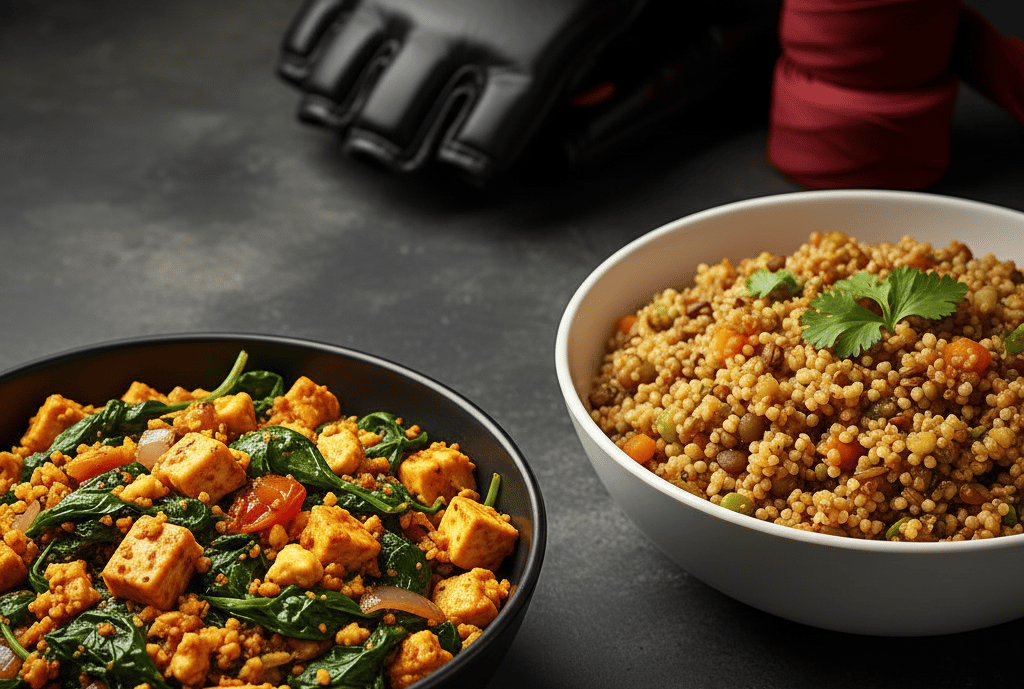Octagon Mode On: The Ultimate Indian Diet Plan for MMA Fighters in Mumbai
Stand-up, ground game, clinch work—you do it all. 👊 Fuel the complete fighter with our ultimate Indian diet plan (veg & non-veg). It's time to dominate every aspect of the fight.
Shuaieb Khan
5/10/20254 min read


Mixed Martial Arts. The name says it all. You’re a striker, a wrestler, and a submission artist, all rolled into one. You need the explosive power of a boxer, the relentless cardio of a Muay Thai fighter, and the grinding muscular endurance of a wrestler. Being an MMA fighter means being the most complete combat athlete in the world. It’s a whole different beast.
And a beast needs a specific kind of fuel. Your diet can't just focus on one thing. It needs to support every single aspect of your game—from explosive takedowns to surviving deep waters in the third round. Your nutrition is the foundation upon which your entire game is built. Let's engineer the perfect fuel for the ultimate fighting machine.
The MMA Nutrition Trinity: Power, Endurance, Recovery
An MMA fighter's diet is a masterclass in balance. Here’s the game plan:
Complex Carbs for The Grind: This is your endurance fuel. Long, grueling sessions of wrestling and jiu-jitsu can drain your energy like nothing else. Complex carbs from sources like oats, brown rice, sweet potatoes, and millets provide the slow-burning energy you need to keep grinding.
Lean Protein for Power & Repair: This is your strength and recovery tool. From powerful striking to controlling an opponent on the ground, you need strong, resilient muscles. Lean protein (chicken, fish, eggs, paneer, tofu, lentils) is critical for building that strength and repairing your body after battle.
Joint Armour (Healthy Fats & Nutrients): Grappling is notoriously tough on your joints. Healthy fats, especially Omega-3s, are crucial for fighting inflammation. Foods rich in antioxidants and vitamins (fruits, veggies) and collagen (bone broth) help keep your joints lubricated and your body resilient.
Pre-Training Fuel: The Final Prep
Eat a well-rounded meal 2-3 hours before you step on the mats. This meal should be a solid mix of complex carbs and protein to fuel both strength and endurance.
Championship Meals:
A bowl of chicken or paneer curry with 2 multigrain rotis.
Quinoa with black beans (rajma) and stir-fried vegetables.
Scrambled eggs with a side of oatmeal.
Post-Training Recovery: Rebuild the Machine
The clock starts the second your training ends. Refuel within 60-90 minutes to maximize recovery.
Quick Re-Up: A whey protein shake with a banana is the GOAT for quick nutrient absorption.
The Main Meal: A nutrient-dense meal to restore energy and repair muscle tissue.
The Complete Indian MMA Fighter's Diet Plan
This is your blueprint for peak performance inside the octagon.
Veg MMA Warrior's Diet Plan
Breakfast: Tofu scramble (bhurji) packed with spinach and mushrooms, with a side of 2 whole-wheat bread slices.
Lunch: A power bowl with brown rice, a generous serving of chana masala, sautéed vegetables, and a dollop of Greek yogurt. This is the whole package.
Snack: A sattu drink or a handful of walnuts and almonds (great for Omega-3s).
Dinner: A large bowl of lentil soup (dal) with lots of added vegetables, paired with a portion of grilled paneer. Focus on easily digestible protein for overnight recovery.
Non-Veg MMA Warrior's Diet Plan
Breakfast: 5-6 egg white omelette with one yolk, filled with veggies. Side of a small bowl of dalia (savoury porridge).
Lunch: 150g of grilled chicken or fish, a serving of millet (bajra) roti, a bowl of sabzi, and a large salad.
Snack: A bowl of bone broth (paya soup) for joint health or a hard-boiled egg.
Dinner: Chicken keema (mince) cooked with green peas, paired with 2 multigrain rotis. It’s a high-protein meal that’s not too heavy on the stomach before bed.
Hydration: Your Most Important Teammate
Dehydration will sabotage your performance faster than anything. It kills your cardio, slows your brain, and weakens your power. Sip water consistently all day. Every single day. No excuses.
Train Like a Pro, Eat Like a King
Your life revolves around training camps, drilling techniques, and sparring. The last thing you have time for is spending hours in the kitchen meal-prepping. That’s where a professional team comes in.
Food Trail Catering Co. is one of the best caterers in Mumbai, not just for our lavish wedding spreads, but for our versatility and understanding of specific dietary needs. We provide top-tier corporate catering services in Mumbai that often include healthy, high-performance menus. Planning a themed party? Our house party catering Mumbai service can be customized to fit any requirement. We are consistently ranked among the top 5 caterers in Mumbai because we deliver on our promise of quality and taste, no matter the occasion.
Frequently Asked Questions (FAQs)
Q1: What's the most important nutrient for an MMA fighter? A: That's a trick question! The most important thing is balance. Unlike a specialized athlete like a powerlifter (protein-focused) or a marathon runner (carb-focused), an MMA fighter needs a balanced intake of all three macronutrients—protein, carbs, and fats—to fuel their diverse training needs.
Q2: How is an MMA diet different from a bodybuilder's diet? A: A bodybuilder's diet is primarily focused on aesthetics and muscle hypertrophy (size). An MMA fighter's diet is 100% focused on performance—endurance, strength, and recovery. This usually means a higher emphasis on performance-fueling carbohydrates and overall athleticism rather than just muscle mass.
Q3: What are some good Indian foods to support joint health? A: Haldi (turmeric) and ginger are powerful natural anti-inflammatories. Foods rich in Omega-3s like fatty fish (bangda, rawas), walnuts (akhrot), and flax seeds (alsi) are excellent. Also, traditional bone broth (paya soup) is rich in collagen, which is great for connective tissues.
Q4: Should I cut weight for MMA? How does diet help? A: Weight cutting is common in MMA but should only be done under the guidance of a professional coach or nutritionist. It involves creating a slight calorie deficit over several weeks to reduce body fat, followed by a carefully managed water-cut just before weigh-ins. It's an advanced strategy that requires careful planning to avoid harming your performance.
